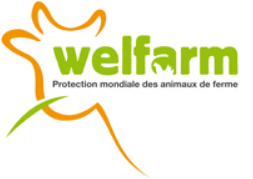Document type : News item from Welfarm
Author: Welfarm
Preview: Following Culture Viande's announced intention to slow the move in France towards ending castration, our mascot, Couic the pig is seriously angry: he's had enough of being castrated! Here in France, physical castration is still performed on about 75% of male piglets, but what are our European neighbours up to? On a mission to find out more, Couic knotted up his possessions in his handkerchief and set out on a tour of Europe. Over the past few weeks he's been posting updates on our social media accounts ...
Leg 1: The UK and Ireland
The UK and Ireland are the European champions in stopping piglet castration. In the UK, 100% of male pigs are reared without castration while the figure in Ireland stands at 90%.
The clue to their success is quite simple. The UK and Ireland have a history of rearing whole male pigs. Here, they don't have to deal with the unpleasantness of 'boar taint' in the meat - the pigs are slaughtered a little earlier than in France, before they reach sexual maturity, which means that the smell, which is linked to the production of hormones at puberty, doesn't occur.
Indeed, the United Kingdom brought a legal halt to the castration of pigs through the animal welfare legislation it introduced in the 1990s. This positive example of animal welfare should be emulated by the other countries in Europe.
Leg 2: the Netherlands
Around 60% of male pigs are reared whole in the Netherlands. They supply the retail sector, where all fresh and processed meat is produced from uncastrated males.
These encouraging figures are largely due to the efforts of the Dutch retail sector, which has made castration compulsory for animal welfare reasons. A first agreement between the retail sector, animal welfare NGOs and the Dutch Ministry of Agriculture in 2007 made castration with anaesthesia compulsory as an interim solution before castration could be fully banned. A second agreement in 2015 made it possible for fresh meat from non-castrated animals in supermarkets to hit the 100% mark.
In addition to this, Dutch retailers require the non-castration of pigs by selling meat only from farms signed up to the Beter Leven (better living) label, intended to improve animal welfare through farming conditions and practices. From the label's lowest category (1 star) upwards, castration is forbidden.
Leg 3: Belgium
Immunocastration is carried out on almost 20% of male pigs born in Belgium. This is an exceptional figure, given that the European average for immunocastrated male pigs is just 2%.
The expansion of immunocastration can be explained by the commitments made by the Belgian retail sector. The supermarket chains Colruyt and Delhaize required vaccination to be used by suppliers until 2018. Since that, only Colruyt continues to require vaccination, while Delhaize has committed itself to the use of whole males.
It is imperative for French supermarkets to follow the example set by their Belgian peers and adopt a formal position that supports alternatives, such as immunocastration, to the physical castration of piglets.
Leg 4: Spain and Portugal
In Spain, 22 million pigs are reared whole without being castrated, which represents about 85% of its male pig production. These are excellent figures for Europe's largest pig producer. In Portugal, more than 90% of males are left whole (2.9 million pigs).
A pig's weight at the time of slaughter in Spain is quite similar to that in France, and has been steadily increasing in recent years. This shows that it is possible to produce uncastrated pigs with comparable slaughter weights to those in France.
There is one black mark, though: castration without anaesthesia continues for piglets destined for top-of-the-range Iberian dry-cured hams from heavy pigs, including Pata Negra and Serrano ham.
Leg 5 (final leg): back to France
Since 1 January 2022, live castration has been prohibited. This form of mutilation can now only be carried out in specified cases, and must be performed under anaesthetic and with the use of analgesia. That said, the legislation governing this practice remains highly unsatisfactory, since castration is still authorised in a very wide range of cases. This situation means that piglets will continue to suffer since, even anaesthesia and analgesia do not fully eliminate the pain experienced in castration. Added to this are other problems such as the high production rates on farms and a lack of training for farmers in the performance of these operations, which have led to concerns that the protocols will be poorly followed in practice. Worse still, the French meat producers' association, Culture Viande, is calling for a reduction in the purchase price of the meat of non-castrated male pigs as a means to slow down transition towards total non-castration. Yet, as Couic's travels have proved, a complete ban on the physical castration of piglets is possible.





